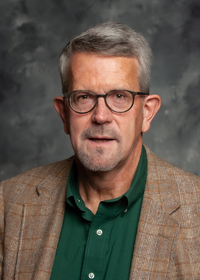Information Possibly Outdated
The information presented on this page was originally released on October 24, 2019. It may not be outdated, but please search our site for more current information. If you plan to quote or reference this information in a publication, please check with the Extension specialist or author before proceeding.
Extension entomologist receives prestigious award
STARKVILLE, Miss. -- Jerome Goddard received the Felix J. Underwood Award from the Mississippi Public Health Association at its 82nd annual conference.
Given to individuals who are dedicated to protecting Mississippians’ health, this award is the organization’s most prestigious honor.
“Dr. Goddard is a scholar, practitioner and teacher who has positively impacted hundreds of people in his public health career,” said association president David Buys, who is Goddard’s colleague and Mississippi State University Extension Service health specialist. “He is a world-renowned medical and veterinary entomologist possibly best known as an effective communicator of complex scientific issues. He is highly deserving of this award and represents all it stands for.”
Goddard is an Extension professor of medical and veterinary entomology in the MSU Department of Biochemistry, Molecular Biology, Entomology and Plant Pathology. He also is an affiliate faculty member at the University of Mississippi Medical Center. Before accepting his position at MSU, Goddard served as the state medical entomologist with the Mississippi Department of Health for 20 years. He was also a medical entomologist while serving as a captain in the U.S. Air Force.
In his 30-year career as an entomologist, he has shared his expertise at conferences and training events nationwide. He testified before Congress in 1999 on the public health benefits of pesticides.
Goddard has published more than 200 scientific papers and 14 books. His medical textbook, “The Physician’s Guide to Arthropods of Medical Importance,” was originally published 26 years ago and is used by physicians worldwide. In its latest edition, the publisher renamed the book, “The Goddard Guide to Arthropods of Medical Importance,” signifying his impact on the discipline. The book earned a “Highly Commended” award in 2013 in the British Medical Association’s Best Medical Book of the Year contest.
As a professor, Goddard works with the U.S. Centers for Disease Control and Prevention to train medical and veterinary entomologists. In addition to his vector-control research, Goddard coordinates and supervises various projects and training programs related to vector ecology and control throughout the state. He also has guided more than 10 graduate students through the dissertation process.
Goddard has been featured in Reader’s Digest and Time magazine and appeared on “The Colbert Report” and the Learning Channel.
Goddard said he is flattered to be recognized with this award but is quick to give credit to key individuals who have worked with him and supported him through the years.
“Way back in the early 1990s, while at the health department, I was ‘in charge’ of the vector control response to several outbreaks of mosquito-borne encephalitis, but I couldn’t have done it without the help and oversight of Dr. Mary Currier and Sheryl Hand,” he said. “Later, I was ‘in charge’ of the entomological response to West Nile during the big outbreak in Mississippi in 2002, but I would have been lost without the help of Dr. Sally Slavinski and Dr. Brigid Elchos. I was supposedly ‘in charge’ of the entire vector-control response along the Mississippi Coast after Hurricane Katrina, but no way could I have done it without encouragement and support from my wife, Rosella, and the direct help of Wendy Varnado, Harry Fulton and Mike Tagert. So, no man or woman is an island. It would be foolish to think otherwise.”
The Underwood award is named after Dr. Felix J. Underwood, who was state health officer from 1924 to 1958. He was a pioneer in public health and helped develop measures that created a strong public health policy which continues to impact health in Mississippi, the U.S. and the world.


